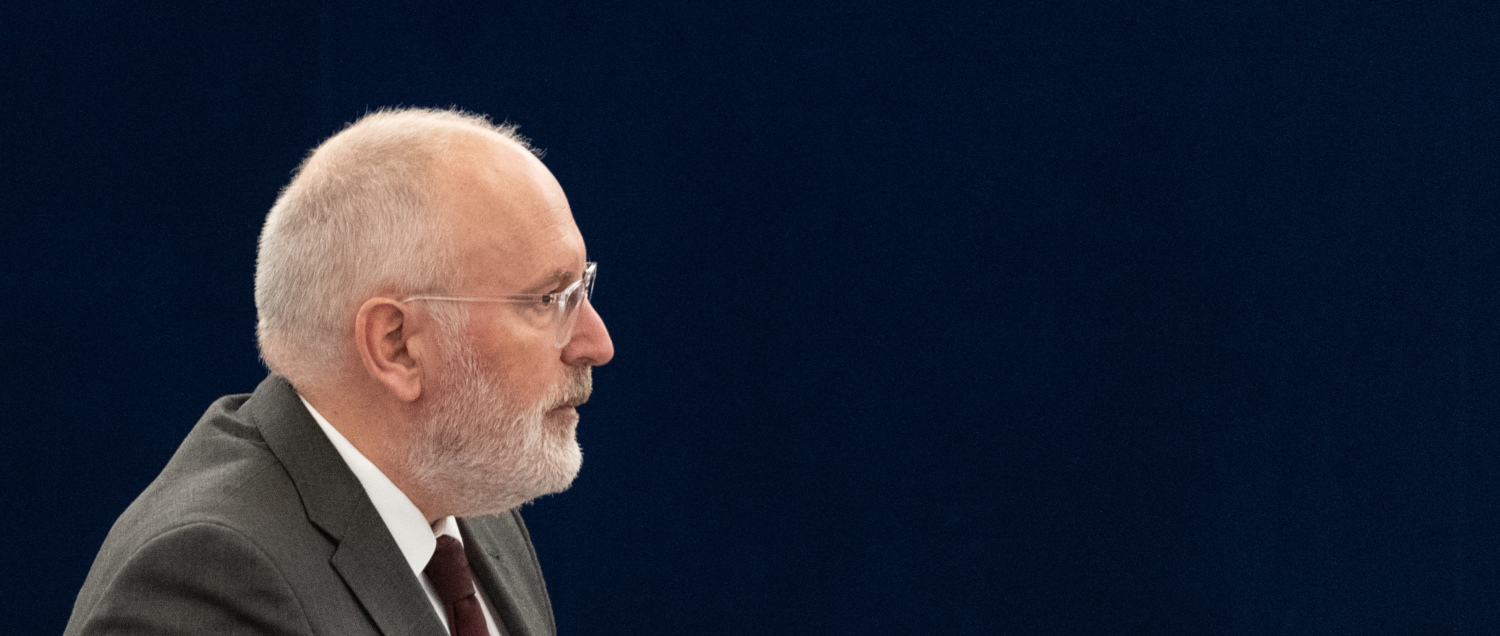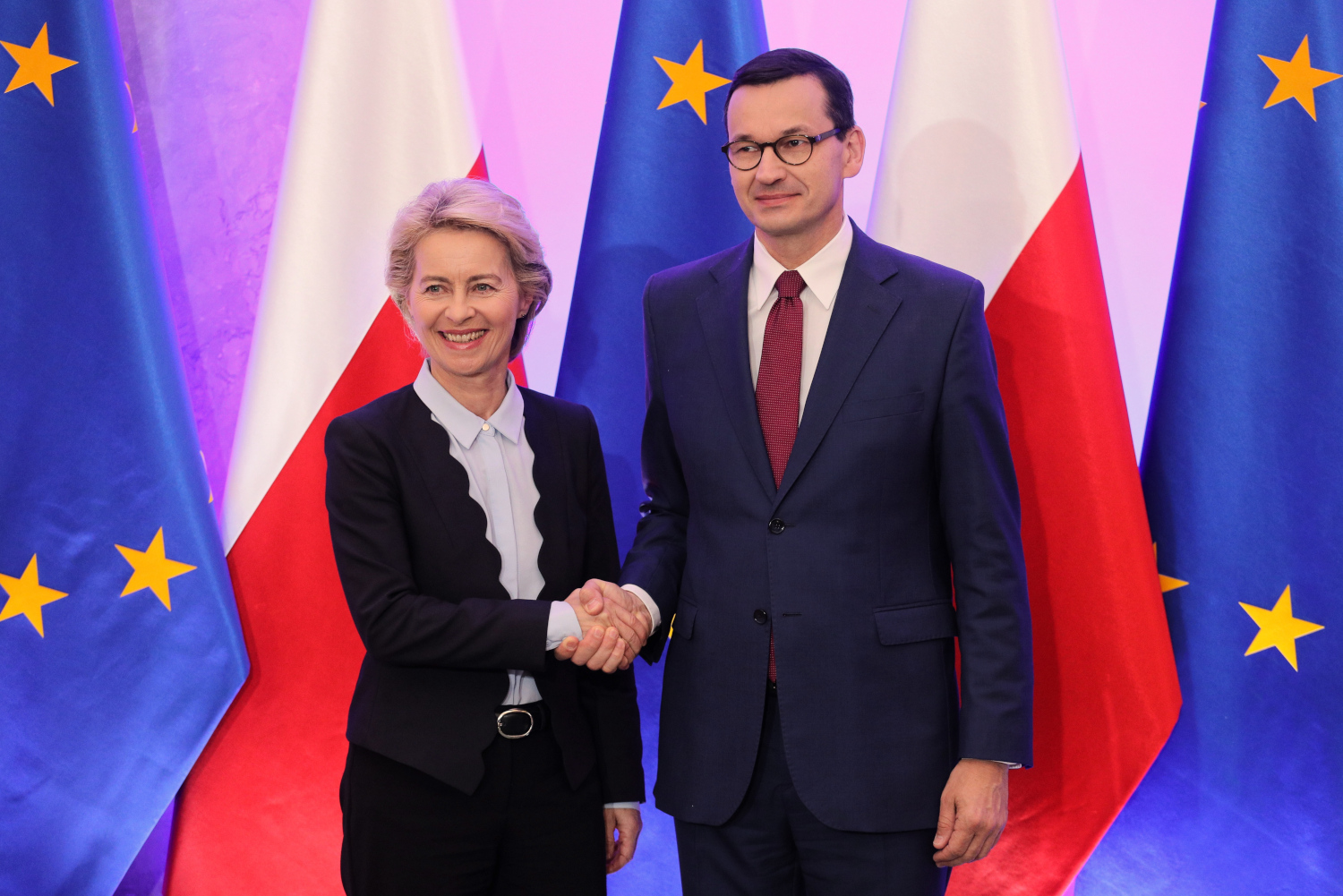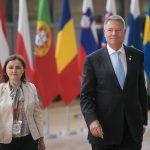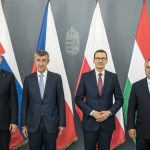THE WARSAW INSTITUTE REVIEW
Date: 4 November 2019 Author: Piotr Bajda
The European Union will be better off without Frans Timmermans
One can assert, without too much doubt, that during the post-electoral phase, in which the European community fills in the most important EU positions, a political storm had passed that turned many otherwise intricately arranged tables upside down. Albeit we are unlikely to fully recognize all the consequences these events have induced just yet; we can define some of the most important results of our decisions.
 First Vice-President of European Commission Frans Timmermans, Belgium, October 23, 2018. © Patrick Seeger (PAP/EPA)
First Vice-President of European Commission Frans Timmermans, Belgium, October 23, 2018. © Patrick Seeger (PAP/EPA)An initial point of all the commotion was the set of decisions made by President of the European Council Donald Tusk and the leaders of four European countries (Germany, France, Spain and the Netherlands) on the margins of the G20 summit in Osaka, Japan. This informal, and clearly beyond-the-treaty group met outside the official EU calendar, far from Brussels, and jointly allocated the key positions for the new term of office of the European Parliament and the European Commission. Other EU members were informed post factum and, confronted with a fait accompli, were left with only the responsibility of authorizing the said already-made vital decisions. The central feature of the so-called Osaka ‘pact of five’ was entrusting the Dutch socialist Frans Timmermans with the role of the President of the European Commission.
NEWSLETTER
The decision taken by the most dominant European politicians seemed to prejudge the matter, and yet this very intricate plan incited defiance of absent decision-makers, which could be an important signal, indicative of new times in the EU. Those as mentioned earlier five European leaders in Osaka were convinced that after the European elections, little had changed, and their decisions would be almost automatically accepted by other members of the European Community, as it was often previously the case. Indeed, there were grounds to think as such – the first hours of the July’s European Council summit did not prognosticate any dramaturgy; they were practically a routine repetition of preceding instances, i.e. several rounds of heated discussions, a few breaks, unofficial arranging of common positions, promises to the undecided, and the highly anticipated negotiation finale. It could be argued that at the beginning of that summit, Polish Prime Minister Mateusz Morawiecki with the Head of Hungarian Government Viktor Orban were alone in their doubts on whether Timmermans was really the optimal candidate for the head of the European Commission.
 President of the European Commission Jean-Claude Juncker, President of France Emmanuel Macron, and President of EU Council Donald Tusk, attend a meeting during the G20 Summit in Osaka, June 29, 2019. fot. JACQUES WITT/AFP/East News
President of the European Commission Jean-Claude Juncker, President of France Emmanuel Macron, and President of EU Council Donald Tusk, attend a meeting during the G20 Summit in Osaka, June 29, 2019. fot. JACQUES WITT/AFP/East NewsNevertheless, it was the attitude of the Polish Prime Minister, supported by the Hungarians, which avidly caused a rather unexpected twist. It aptly gave others a signal to protest against this manner of making decisions through bypassing treaty bodies and the intergovernmental dimension of the community. Most significantly, the Visegrad Group appeared again on the European forum as a compact block of resistance to such imposed decisions. It is worth emphasizing that the unity of V4 against Timmermans’ candidacy was not obvious. The Prime Ministers of the Visegrad countries represent the circles sitting in various European political groups: Poland’s Law and Justice forms the core of European conservatives and reformists, Hungary’s Fidesz is in the main European People’s Party faction, the Czech Republic’s ANO is in the liberal group, and Slovakia’s Smer-SD is part of the European socialist family. Notwithstanding such a diverse political mixture, they adopted a joint position pertaining to the President of the European Commission. Especially for the Slovaks, persevering in resistance to the imposed decisions had to have been difficult, yet at the end of the day, they opposed the socialist’s candidacy. We do not know this for certain at the current stage, but it is most probable that during these negotiations, the smaller EU countries have been met with various forms of pressure or unique persuading offers to handle matters which are important to them, in exchange for supporting Timmermans. It is not farfetched to imagine that Czech Prime Minister Andrej Babiš could have been met with a suggestion that sounded like problems regarding settling the European subsidy for Stork Nest, the congress center, being built by his firm could just “be dealt with.” Meanwhile, the Slovak delegation could have heard that corruption problems or ambiguities related to the post-murder prosecutor’s investigation in 2018 of the investigative journalist Ján Kuciak do not constitute grounds to doubt the Slovak rule of law. Despite these tempting perspectives, Prime Minister Babiš explicitly stated that Frans Timmermans is a man who divides, not unites and that the Slovaks, seeing the chance to build a blocking minority, did not break out of the new coalition until the last moment. The Visegrad Group alone is not enough to block decisions taken on the European forum under the qualified majority procedure, which are unfavorable from the point of view of Central European countries. Still, the signal sent by V4 was picked up by others. Italy joining the group blocking Timmermans’ choice was most pivotal. Rome, offended by their omission in negotiations on the allocating EU positions, could have decided that by impeding the Osaka pact, it would convey its aspirations and position as one of the largest and most consequential EU countries. The unity of V4 meant that other states, namely with Lithuania and Estonia at the forefront, decided that it was worth joining this bloc.
Support Us
If content prepared by Warsaw Institute team is useful for you, please support our actions. Donations from private persons are necessary for the continuation of our mission.
After the European Council summit, the comments often accentuated that the nail in the coffin was the resistance exhibited by some Prime Ministers of EU countries represented in the Christian Democrats’ group from outside of Central Europe. In all, it is possible to reconstruct the course of events that led to the spectacular defeat of Frans Timmermans and the whole idea of imposing decisions by an informal leadership group. Even more intriguing is the attempt to identify the initial effects of these events, which in the long term, may have an impact on the functionality of the new European Commission chaired by Ursula von der Leyen. Perhaps the first self-fulfilling conclusion drawn may be that the rebellion of Prime Minister Morawiecki, supported by V4 and later by other countries, restored the order of things in the European Union. Rejuting the bundle from Osaka meant that it was within the basic EU intergovernmental format that the most important decisions were made, and not solely the arrangements made by the informal group were authorized. Restoring the proper role of Member States, in the long run, seems to be one of the necessary conditions for the successful reform of the European Union, it cannot be done contradictory to governments elected in free elections and having a sufficiently strong social mandate. In addition, the July events in the European Council may be a helpful lesson for the future, showing the new European Commission that the Member States do not intend to let themselves be treated as subjects. We can hope that this experience will lead to internal limitation by the new leaders of the Community institutions in attempts to impose their will against others and to expand their own competences against EU treaties, which unfortunately was a common practice of the outgoing European Commission. The second, no less important, result of July’s events is the strengthening of the position of Central European countries, which by many Western European capitals are still treated as new and not yet Europeanized members of the community. The concentration of the blocking minority around the Visegrad Group, regarded in terms of the nucleus of Central European cooperation, was a strong signal for the region’s empowerment and declaring aspirations to be treated as one of the key actors in shaping European policy. Additionally, the success of the V4 may mean that in the future, especially small EU countries will seek opportunities to build broader coalitions around the Visegrad Group. It will be crucial whether the Visegrad Group countries make joint decisions to use the V4 format more often to consolidate supporters of decisions going against the largest capitals or Community institutions. Such an alternative decision-making center can be particularly attractive for small European Union countries, which were often forced to make decisions against their interests. The example that this dictate can be broken can be attractive and contagious for the future.
 Prime Minister Mateusz Morawiecki and newly nominated President of the European Commission Ursula von der Leyen during the meeting in the Chancellery of the Prime Minister, Warsaw, July 25, 2019. © Paweł Supernak (PAP)
Prime Minister Mateusz Morawiecki and newly nominated President of the European Commission Ursula von der Leyen during the meeting in the Chancellery of the Prime Minister, Warsaw, July 25, 2019. © Paweł Supernak (PAP)Timmermans’ defeat may have one more positive consequence. For future leaders of the European institutions it will be a warning, and they would think twice before attempting to actively engage in political struggles in a particular member country, ostentatiously advocating one of the opposition parties to the dispute. It should be expected that European Commissioners can be more restrained in their acts of demonstrative support for specific political environments. Timmermans’s actions against the governments in Poland and Hungary additionally had something perfidious about them; the Dutch politician did not hide that he was well-aware of applying double standards – different towards Warsaw and Budapest, and different towards the other Member States, in which he believes more European elites are in power. Illustrating this best was Timmermans selling journalists questions about his assessment of the brutality of the French police pacifying protests of the “yellow vests” movement. What, however, can be considered a sign of justice is that these actions did not bring him to the top of the European Commission, but have become one of the main reasons for his defeat. Instead of becoming a star in European salons, an effective fighter for democracy, and the rule of law, he became perceived as a politician in its full toxic sense. Even if Timmermans remains one of the EU commissioners, his influence will be substantially more limited than previously, and he will certainly be removed from matters concerning the rule of law. This gives a chance to normalize relations between Warsaw and Brussels for the benefit of the entire European Union. Each of the more intelligent and diplomatically savvy politicians who aim to build their career in the European institutions will analyze this story and draw appropriate conclusions from it. One could consider that we can already observe the first who drew a moral from this story. The new head of the European Commission, Ursula von der Leyen, for her second foreign trip (after France, because talks in Germany are difficult to treat as a foreign visit) chose Warsaw. She had sent a few very significant signals before, like the one which was referring to Poland having received over a million Ukrainians, or the mentions regarding the rule of law as a criterion for assessing each of the EU countries. Of course, the President of the European Commission will have to balance between different environments, sometimes assessing the situation quite differently or with other goals. However, many signals show that there is a chance for a more balanced European policy, conducted on the principles of compromise and negotiation. In addition, the experience of Ursula von der Leyen as the Minister of Defense gave her a chance to form a more realistic and acute understanding of the threats associated with the activities of the Russian Federation in the international arena. Hence the announcement of the future head of the European Commission that the EU will conduct some dialogue with Russia. However, it is only for time to show whether she will be more temperate towards the progressive agenda, implemented in recent years by various European institutions and liberal-leftist environments. An additional effect of the election of the German Minister of Defense now as the head of the European Commission will be the more direct responsibility of Germany for the fate of the EU. So far, Berlin has been very effective in achieving its goals, taking advantage of the situation that representatives of other countries were at the head of the EU institutions. The fact that the European Commission is being led by a German politician will force one to act unmasked or with self-restraint, so as not to strengthen the feeling that Berlin is realizing its goals with the help of the EU, sometimes even against the interests of the community. Indubitably, such a litmus test for the new European Commission will be the Community energy policy and the position of EU authorities towards trying to make Europe dependent on the supply of Russian energy resources, with the Russian-German Nord Stream 2 project at the forefront. Perhaps that is why the authors of the article in Politico supposed for that Angela Merkel, the July European Council was the greatest humiliation she had experienced in the history of her office as German chancellor[1]. To sum up – it can be deduced that the future endeavors of the new European Commission should be viewed with small optimism. There is a chance that Central Europe will not be so ostentatiously overlooked, and Poland and Hungary will cease to be full-time candidates for playing the role of black sheep and whipping boys. If, for the change of the climate of relations within the EU, the Central European region will have to pay the price in the form of the lack of its representatives at the most important Community offices, this is a rather acceptable cost. The Osaka Pact also did not offer any serious place for a representative of our region, which, in some analysts’ comments, was the result of a low assessment of the results of Donald Tusk’s actions as the President of the European Council. Bearing in mind the challenges facing the EU, the Central European region, even in the context of the violation of international law by the Russian Federation, instead of “a second Tusk”, it is better to have a more united community, able to cooperate at intergovernmental level and to respect each other.
All texts published by the Warsaw Institute Foundation may be disseminated on the condition that their origin is credited. Images may not be used without permission.














